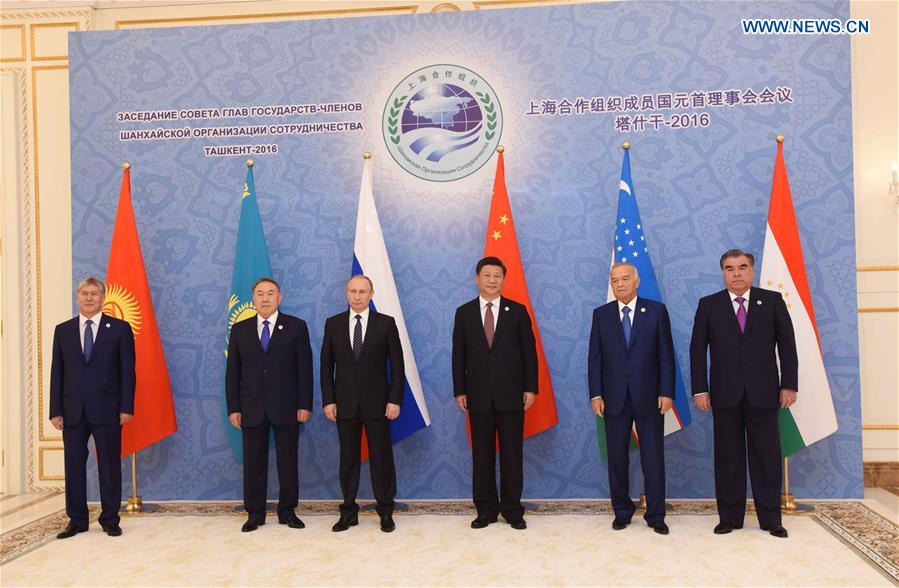SCO leaders vow to lift cooperation to "qualitatively new level"

TASHKENT -- Chinese President Xi Jinping (3rd R) and leaders of other Shanghai Cooperation Organization (SCO) member states pose for a group photo before the 16th SCO Council of Heads of State meeting in Tashkent, Uzbekistan, June 24, 2016. (Xinhua/Rao Aimin)
TASHKENT, June 24 (Xinhua) -- Leaders of the member states of the Shanghai Cooperation Organization (SCO) vowed on Friday to raise the regional cooperation to a qualitatively new level.
The heads of state of the SCO signed the Tashkent Declaration of the 15th Anniversary of the SCO at the 16th meeting of the Council of Heads of State of the SCO, a two-day summit in Tashkent.
The leaders noted that the SCO cooperation has produced fruitful results and that "all preconditions are in place now" to upgrade the cooperation, according to a report on the outcomes of the meeting.
The new level of cooperation will be "characterized by increasing the efficiency of cooperation in the spheres of politics, security, economy, development of cultural and humanitarian ties," said the report.
The leaders at the meeting also reaffirmed that the organization, currently grouping China, Kazakhstan, Kyrgyzstan, Russia, Tajikistan and Uzbekistan, is open for accession by interested states which meet the criteria and conditions.
PAIRING OF ECONOMIC DEVELOPMENT STRATEGIES
The leaders noted that the world economy is still suffering from the effects of the global financial and economic crisis.
The SCO member states should "strive for a profound transformation of the global economy through large-scale, structural reforms, diversified and improving competitiveness of economies and innovative development on a long-term basis," they said.
The significant potential for trade and economic relations and investment cooperation within the SCO framework, accumulated over the past 15 years, provides for the expansion of the cooperation, they said.
The member states vowed to seek the pairing of their national development strategies and strengthen the cooperation in their economic and trade programs.
The leaders reaffirmed the support for the Silk Road Economic Belt, a regional development initiative proposed by Chinese President Xi Jinping in 2013 that seeks to boost regional economic activities by linking China with Europe through Central and Western Asia by inland routes.
They promised to jointly construct the Silk Road Economic Belt, which they said can be one of the tools for facilitating regional economic cooperation.
The member states also agreed to continue mutually beneficial multi-faceted cooperation in energy, transport corridors, public health, science and technology, education, environmental protection, sports, tourism and preservation of cultural and natural heritage.
SECURITY COOPERATION REMAINS ONE OF PRIORITIES
The leaders at the Tashkent summit held important consensus on security cooperation.
The SCO member states called for joint and consolidated efforts and comprehensive measures to deal with the growing threat of international terrorism and extremism and address their root causes.
It remains one of the priorities of the SCO cooperation to fight against the "three evil forces" of terrorism, separatism and extremism in all their manifestations, illicit drug production and trafficking, smuggling of arms, ammunition and explosives, as well as proliferation of weapons of mass destruction and various means of delivery.
The heads of state voiced their support for the early adoption of the United Nations Comprehensive Convention on International Terrorism.
They also voiced support for closer cooperation in fighting terrorism, separatism and extremism, curbing the spread of extremist ideology, especially among the youth, and preventing ethnic, racial, religious discrimination and xenophobia. The member states will continue working on the preparation of the SCO Convention on Combating Extremism, which will be an important part of the legal basis of the cooperation in this regard.
The SCO member states also pledged concerted work in combating transnational organized crime, as well as crimes that make use of modern information and communication technologies.
STEADY PROGRESS TOWARD BLOC EXPANSION
The SCO member states signed memoranda on obligations of India and Pakistan to obtain the SCO member state status, a key step in the process of the two countries' moving towards SCO membership.
The move will enrich the potential of the SCO and contribute to the enhancement of its role in the international arena, they said.
The member states stand ready to continue improving the mechanism of regular consultations with the observer states and dialogue partners.
They reiterated that activities of the organization are not directed against other states or international organizations, and that they are willing to develop contacts and cooperation with other countries, and regional and global organizations that share the goals of the SCO Charter and other fundamental documents.
They stressed the importance of enhancing mechanisms of global governance based on the UN Charter, so as to achieve a fairer and more equitable world order.
The member states said they are committed to further strengthening the central coordinating role of the UN in international relations, and support consultations in search of a "package solution" to the reform of the UN Security Council.
They welcomed the beginning of the practical implementation of the Joint Comprehensive Plan of Action to resolve the Iranian nuclear issue.
[ Editor: zyq ]




More From Guangming Online
Medics from Fujian leave for Shanghai to aid in battle against COVID-19 resurgence
New int'l land-sea transport service to Indo-China Peninsula launched
Another makeshift hospital under construction in Shanghai
Tourists view tulips in Suiping County, Henan
In pics: blooming gagea flowers on grassland in Zhaosu, Xinjiang
Greek workers stage 24-hour general strike over high prices